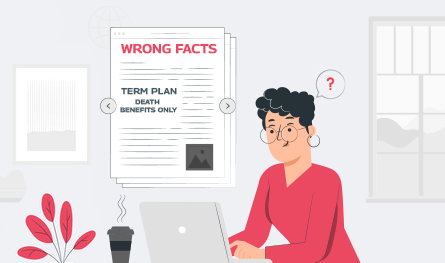Term Insurance Myths Busted: What You Should You Know?

Term insurance is one of the simplest forms of life insurance. However, it is one of the most misunderstood life insurance products. Despite it being one of the purest life insurance forms, it is not yet a very popular choice among the majority. The principal reason behind this is certain myths and misunderstandings around this plan and the benefits or disadvantages associated with it.

Popular misconceptions about term insurance
Myth 1: Term plans solely offer death benefits, making it a poor investment choice
One of the most highlighted misconceptions about term plans is that since it does not offer any maturity benefit like other financial instruments, it is a poor investment option.
Fact:
But, the truth is, though term plans do not offer any maturity benefit, they can never be considered a waste of money. Excluding maturity benefits, they offer several other advantages.
An untimely death in the family might be not only an emotional thud, but it can even jeopardise the financial situation, too. Term plans are here to save you from such rainy days. Your family can easily avoid financial crunches using the term insurance death benefit, provided your coverage limit is sufficient to sustain all your financial responsibilities and obligations.
Also, there is one Term plan variant: Term plan with Return of Premium or TROP. In this variant, if you outlive the entire policy tenure, the premiums paid during the entire policy tenure are refunded as a maturity benefit.
Myth 2: If single, you do not need a term plan:
It is a common misconception that term plans are made for family persons, and single people do not require them.
Fact:
But, the truth is, a term plan maturity comes in handy to repay your loans and debts even if you are single. Your extended family members must never be forced to repay your loans and debts due to your untimely demise. Moreover, if you are the sole breadwinner in the family, you need to prepare a backup for securing their existing lifestyle without compromise.
Also, if you plan to get married at a future date, this plan could come in handy to protect your family from any unprecedented events, like your untimely death. So, term insurance is considered as a Plan B for your financial planning.
Myth 3: Term plans are expensive:
We tend to believe that term plans are costly without digging up the truth. However, the truth is different.
Fact:
Term plans exclusively offer high coverage at reasonable premium rates. This is actually one of the most affordable options to avail high coverage at a low cost.
Myth 4: The coverage must be exclusively for your current income
You can opt for term insurance coverage for your current income alone. However, it is prudent to take futuristic coverage.
Fact:
So, if you opt for coverage that either increases with time; or choose to increase your coverage from time to time if the premium is a concern; or you can opt for higher coverage at a lower age since the premiums are locked for life; you would stand to gain.
Your selection must be crucially sufficient enough to replace your current income for your family to ensure financial protection without any compromise.
Pro Tip:
Ideally, if your current annual income is INR 7 lakhs, then your term plan value must be ideally 10-15 times more than that. However, if it is below the INR 7 lakhs threshold, the ideal term coverage must be 20 times your yearly income.
Myth 5: If you have Group cover, you do not need another plan:
Most organisations offer group insurance plans as a perk for their employees, but there are certain typical limitations to them:
- The group coverage might prove to be insufficient for your entire family.
- Group term cover remains in force as long as you are associated with the concerned employer and organisation. It will automatically cease to exist as soon as you change your job.
- Group term covers usually follow the terms and conditions of the concerned employer. But as an employee, your circumstances might be grossly different and this cover may become almost irrelevant.
Fact:
Ideally you should take a separate term insurance plan which can be continued for as long as you want, without having to worry about its continuity.
Considering all these aspects, it is best to maintain a personal term life insurance protection cover to ensure financial security for your beloved family members.

Author Bio
Paybima Team
Paybima is an Indian insurance aggregator on a mission to make insurance simple for people. Paybima is the Digital arm of the already established and trusted Mahindra Insurance Brokers Ltd., a reputed name in the insurance broking industry with 17 years of experience. Paybima promises you the easy-to-access online platform to buy insurance policies, and also extend their unrelented assistance with all your policy related queries and services.
Other Life Insurance Products
Latest Post
In a country where medical inflation is rising rapidly, securing a comprehensive health coverage plan for the entire family is no longer optional, it is essential. Selecting the right health insurance requires careful evaluation of multiple factors, not just premium costs. A well-chosen plan ensures financial security, access to quality healthcare, and peace of mind during medical emergencies.


Term insurance is an important investment. However, with the availability of so many insurers offering term plans, it becomes difficult to select the best term plan to suit your needs. Buying a term plan needs some consideration and research on the part of the policyholder. In this post, let us discuss the best term insurance providers in India.


Have you ever caught yourself lost in illusions about your daughter's future events, such as her university convocation and first day at work? Her university convocation. When she embarks upon her initial job after graduation will be the day.

.png)
When you sign up for a life insurance policy - whether it’s a traditional term insurance policy or a ULIP – you are not just buying peace of mind. You are also trusting the insurer with your money. So naturally, you would want to know: How is that money being managed? And more importantly, how is it being protected from risky decisions?

.png)
Globally, 20th October marks the day to observe World Osteoporosis Day. Do you know the significance of observing Osteoporosis on a global platform? Do you know how this condition affects people and their lives? Let us find out in this post!




